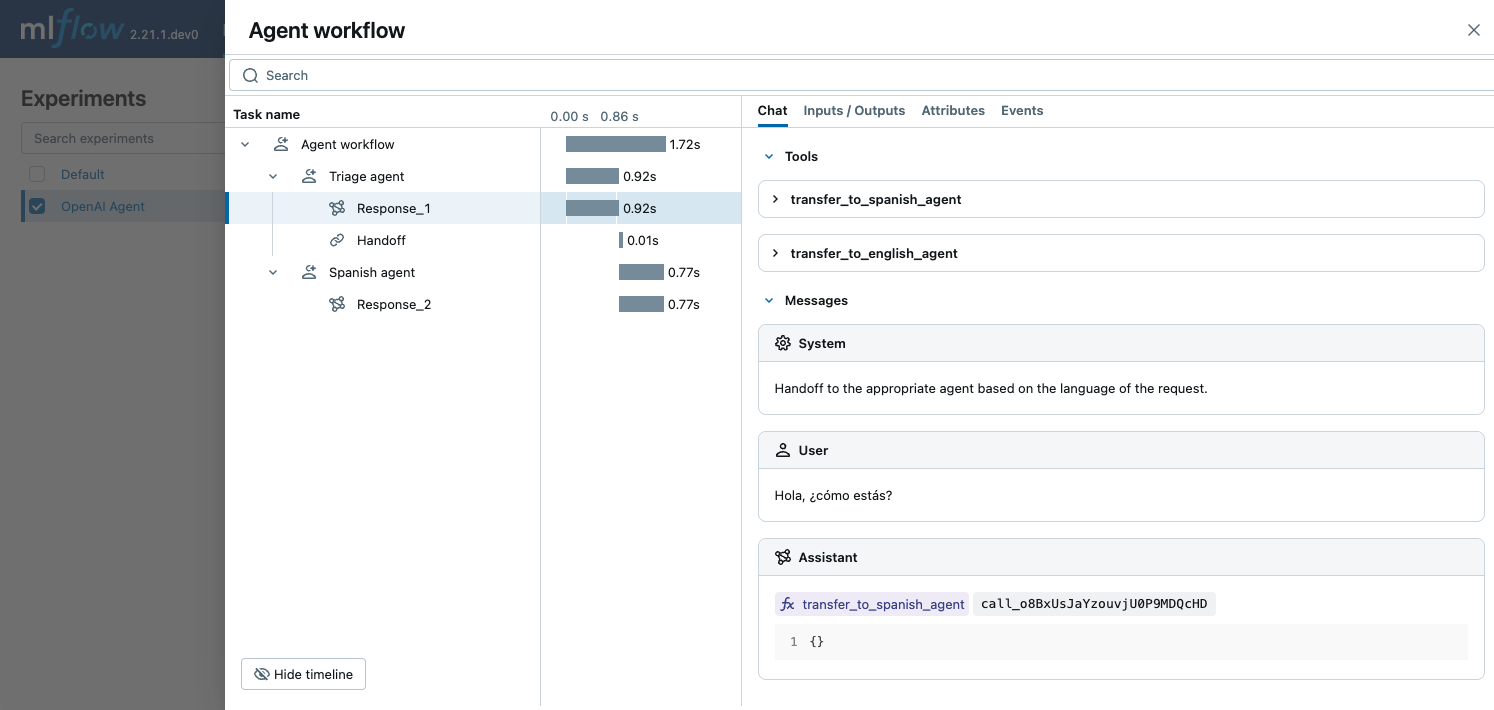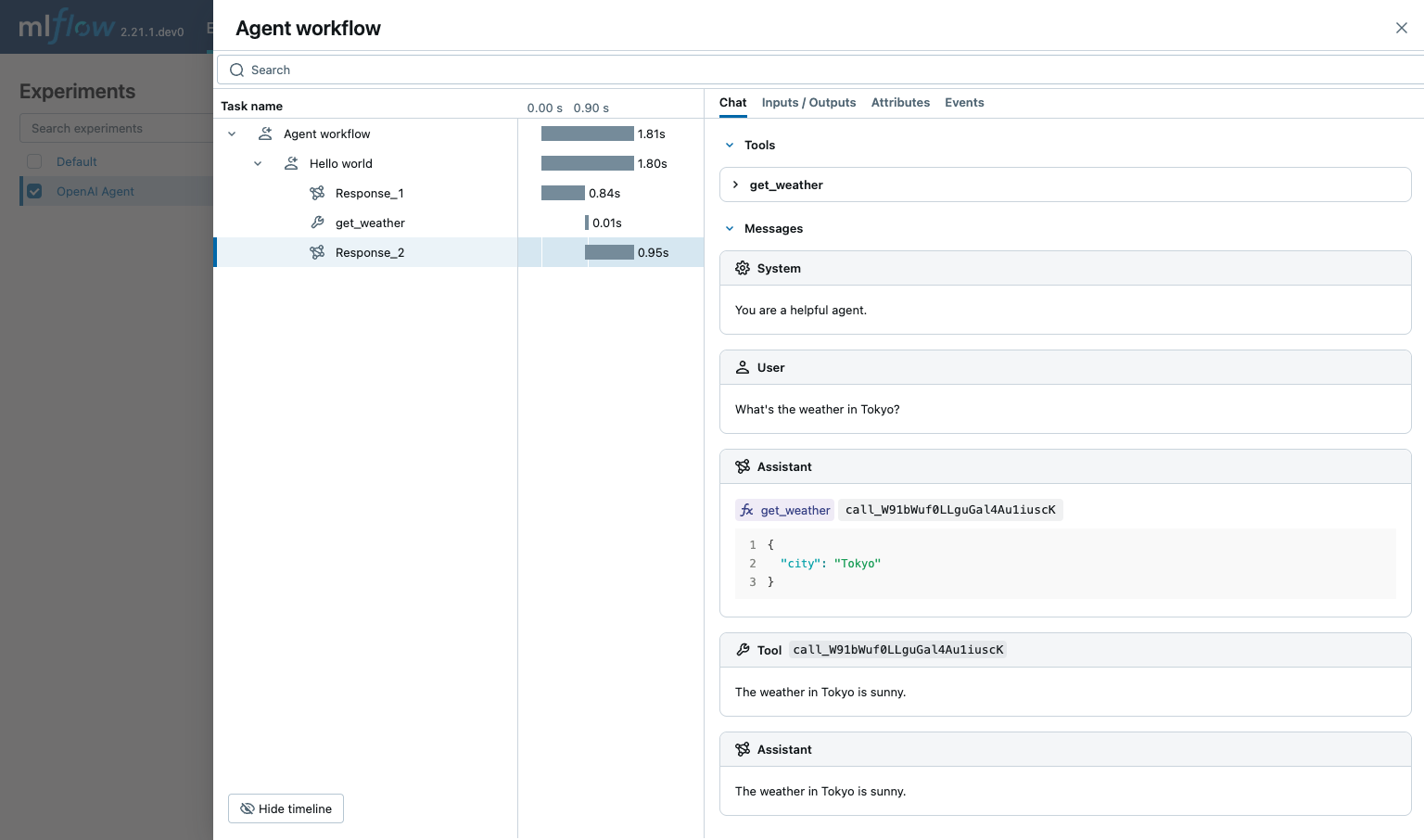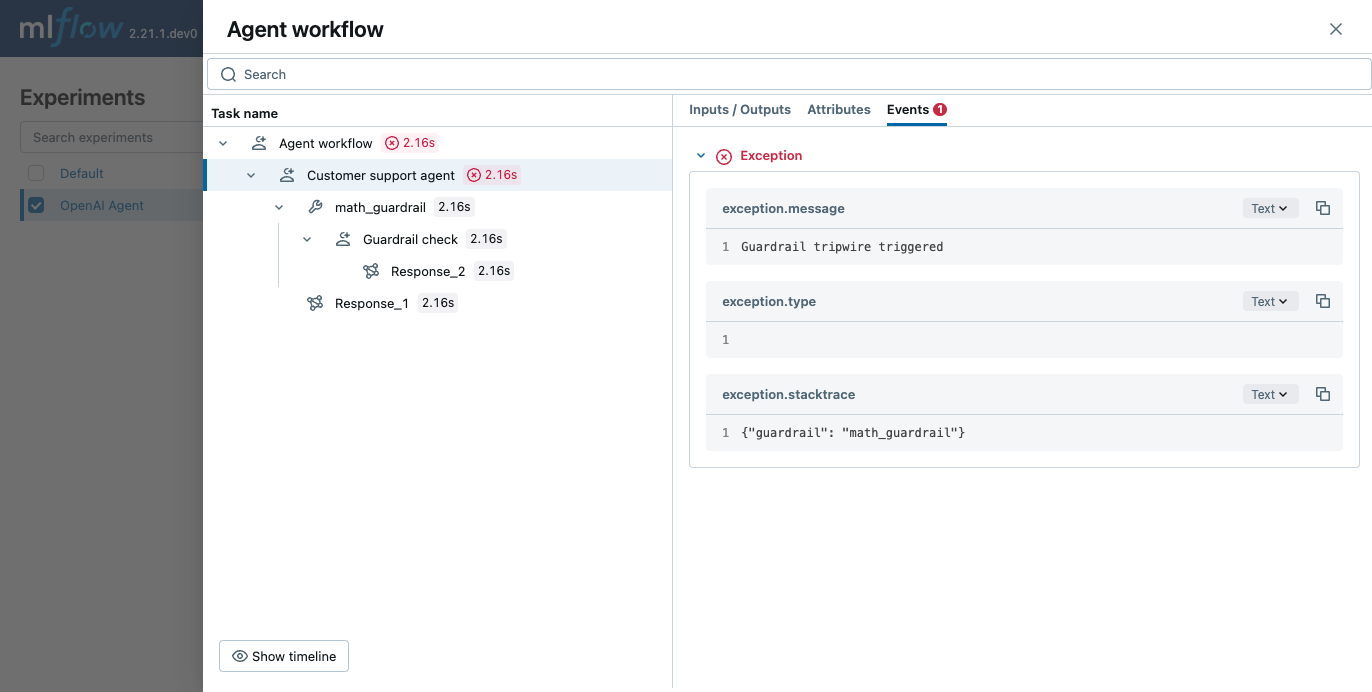OpenAIエージェントのトレース

MLflow Tracingは、OpenAIが開発したマルチエージェントフレームワークであるOpenAI Agents SDKに自動トレース機能を提供します。自動トレースを有効にする
OpenAI の場合、mlflow.openai.autolog 関数を呼び出すことで、MLflow トレースをキャプチャし、アクティブなMLflowエクスペリメントに記録します。
import mlflow
mlflow.openai.autolog()
サーバレス コンピュート クラスタでは、生成 AI トレースフレームワークの自動ログは自動的に有効になりません。 トレースする特定の統合に対して適切な mlflow.<library>.autolog() 関数を呼び出して、自動ログを明示的に有効にする必要があります。
前提 条件
OpenAI Agents SDKでMLflow Tracingを使用するには、 MLflow、OpenAISDK、およびopenai-agents ライブラリをインストールする必要があります。
- Development
- Production
開発環境の場合は、Databricks extras、 openai、 openai-agentsを含む完全な MLflow パッケージをインストールします。
pip install --upgrade "mlflow[databricks]>=3.1" openai openai-agents
フル mlflow[databricks] パッケージには、Databricks でのローカル開発と実験のためのすべての機能が含まれています。
本番運用デプロイメントの場合は、 mlflow-tracing、 openai、 openai-agentsをインストールします。
pip install --upgrade mlflow-tracing openai openai-agents
mlflow-tracingパッケージは、本番運用での使用に最適化されています。
MLflow 3 は、OpenAI エージェントで最適なトレース エクスペリエンスを実現するため、強くお勧めします。
例を実行する前に、環境を構成する必要があります。
Databricks ノートブックの外部ユーザーの場合 : Databricks 環境変数を設定します。
export DATABRICKS_HOST="https://your-workspace.cloud.databricks.com"
export DATABRICKS_TOKEN="your-personal-access-token"
Databricks ノートブック内のユーザーの場合 : これらの資格情報は自動的に設定されます。
API キー : OpenAI API キーが構成されていることを確認します。本番運用環境では、安全な キー管理のために、ハードコードされた値の代わりにMosaic AI Gateway またはDatabricksシークレットAPI を使用します。
export OPENAI_API_KEY="your-openai-api-key"
基本的な例
次の例は、OpenAI Agents SDK と MLflow トレースを使用して、単純な多言語チャット エージェントを実現する方法を示しています。3 つのエージェントは協力して、入力の言語を決定し、その言語を話す適切なサブエージェントに引き継ぎます。MLflow は、エージェントが相互に対話し、OpenAI API を呼び出す方法をキャプチャします。
import mlflow
import asyncio
from agents import Agent, Runner
import os
# Ensure your OPENAI_API_KEY is set in your environment
# os.environ["OPENAI_API_KEY"] = "your-openai-api-key" # Uncomment and set if not globally configured
# Enable auto tracing for OpenAI Agents SDK
mlflow.openai.autolog() # This covers agents if using openai module for LLM calls
# If agents have their own autolog, e.g., mlflow.agents.autolog(), prefer that.
# Set up MLflow tracking to Databricks
mlflow.set_tracking_uri("databricks")
mlflow.set_experiment("/Shared/openai-agent-demo")
# Define a simple multi-agent workflow
spanish_agent = Agent(
name="Spanish agent",
instructions="You only speak Spanish.",
)
english_agent = Agent(
name="English agent",
instructions="You only speak English",
)
triage_agent = Agent(
name="Triage agent",
instructions="Handoff to the appropriate agent based on the language of the request.",
handoffs=[spanish_agent, english_agent],
)
async def main():
result = await Runner.run(triage_agent, input="Hola, ¿cómo estás?")
print(result.final_output)
# If you are running this code in a Jupyter notebook, replace this with `await main()`.
if __name__ == "__main__":
asyncio.run(main())
関数呼び出し
OpenAI Agents SDK は、エージェントが呼び出すことができる関数の定義をサポートしています。MLflow は関数呼び出しをキャプチャし、エージェントが使用できる関数、呼び出された関数、および関数呼び出しの入力と出力を表示します。
import asyncio
from agents import Agent, Runner, function_tool
import mlflow
import os
# Ensure your OPENAI_API_KEY is set in your environment
# os.environ["OPENAI_API_KEY"] = "your-openai-api-key" # Uncomment and set if not globally configured
# Enable auto tracing for OpenAI Agents SDK
mlflow.openai.autolog() # Assuming underlying LLM calls are via OpenAI
# Set up MLflow tracking to Databricks if not already configured
# mlflow.set_tracking_uri("databricks")
# mlflow.set_experiment("/Shared/openai-agent-function-calling-demo")
@function_tool
def get_weather(city: str) -> str:
return f"The weather in {city} is sunny."
agent = Agent(
name="Hello world",
instructions="You are a helpful agent.",
tools=[get_weather],
)
async def main():
result = await Runner.run(agent, input="What's the weather in Tokyo?")
print(result.final_output)
# The weather in Tokyo is sunny.
# If you are running this code in a Jupyter notebook, replace this with `await main()`.
if __name__ == "__main__":
asyncio.run(main())

本番運用環境では、安全な キー管理のために、ハードコードされた値の代わりにMosaic AI Gateway またはDatabricksシークレットAPI を使用します。
ガードレール
OpenAI Agents SDK は、エージェントの入力と出力を確認するために使用できるガードレールの定義をサポートしています。MLflow は、ガードレール チェックをキャプチャし、ガードレール チェックの背後にある理由と、ガードレールがトリップしたかどうかを表示します。
from pydantic import BaseModel
from agents import (
Agent,
GuardrailFunctionOutput,
InputGuardrailTripwireTriggered,
RunContextWrapper,
Runner,
TResponseInputItem,
input_guardrail,
)
import mlflow
import os
# Ensure your OPENAI_API_KEY is set in your environment
# os.environ["OPENAI_API_KEY"] = "your-openai-api-key" # Uncomment and set if not globally configured
# Enable auto tracing for OpenAI Agents SDK
mlflow.openai.autolog() # Assuming underlying LLM calls are via OpenAI
# Set up MLflow tracking to Databricks if not already configured
# mlflow.set_tracking_uri("databricks")
# mlflow.set_experiment("/Shared/openai-agent-guardrails-demo")
class MathHomeworkOutput(BaseModel):
is_math_homework: bool
reasoning: str
guardrail_agent = Agent(
name="Guardrail check",
instructions="Check if the user is asking you to do their math homework.",
output_type=MathHomeworkOutput,
)
@input_guardrail
async def math_guardrail(
ctx: RunContextWrapper[None], agent: Agent, input
) -> GuardrailFunctionOutput:
result = await Runner.run(guardrail_agent, input, context=ctx.context)
return GuardrailFunctionOutput(
output_info=result.final_output,
tripwire_triggered=result.final_output.is_math_homework,
)
agent = Agent(
name="Customer support agent",
instructions="You are a customer support agent. You help customers with their questions.",
input_guardrails=[math_guardrail],
)
async def main():
# This should trip the guardrail
try:
await Runner.run(agent, "Hello, can you help me solve for x: 2x + 3 = 11?")
print("Guardrail didn't trip - this is unexpected")
except InputGuardrailTripwireTriggered:
print("Math homework guardrail tripped")
# If you are running this code in a Jupyter notebook, replace this with `await main()`.
if __name__ == "__main__":
asyncio.run(main())

自動トレースを無効にする
OpenAI Agents SDK の自動トレースは、 mlflow.openai.autolog(disable=True) または mlflow.autolog(disable=True)を呼び出すことでグローバルに無効にできます。